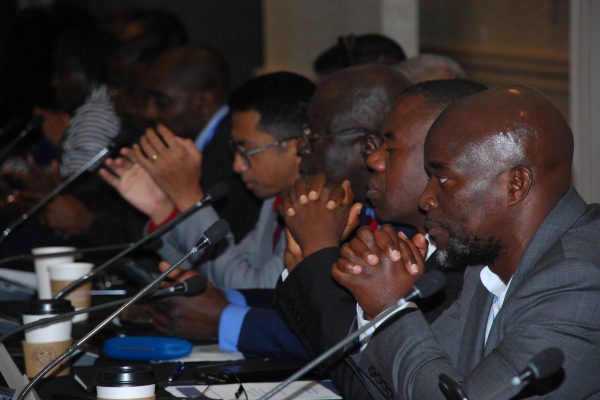The Africa Center for Strategic Studies convened its 2025 Community Chapter Leaders’ Forum on March 25–26, drawing together a vibrant and diverse group of more than 60 participants. Held virtually, the two-day event brought together alumni chapter leaders, U.S. embassy representatives, and alumni seeking to launch or reinvigorate chapters—united by a shared commitment to regional cooperation and to strengthening the vital linkages among the military, civilian government institutions, and civil society.
This year’s forum centered on two foundational themes: civil-military relations (CMR) and the organizational development of Africa Center alumni chapters and communities. Both are critical to fostering effective and resilient national security frameworks across Africa. The event reinforced the Africa Center’s ongoing commitment to supporting its alumni network, strengthening chapter cohesion, and advancing democratic values and healthy civil-military relations across the continent.
A Platform for Strategic Dialogue
The forum opened with a series of compelling presentations from leading experts, including Dr. Mathurin Houngnikpo and Dr. Mphatso Bothi Phiri, who underscored the importance of healthy, transparent, and accountable civil-military relations as a cornerstone of peace and stability. Their insights emphasized the need for national security strategies prioritizing human security—approaches that place citizens and their confidence in military and civilian institutions to address their concerns at the center of security strategy development, planning, and implementation.
Chapter leaders from across the continent also weighed in on these questions, highlighting how their chapters serve as essential conduits between military institutions, civilian communities, and government entities. Through this bridging role, chapters can contribute to fostering trust, shaping public dialogue, and promoting legitimate, transparent, and accountable processes within national security ecosystems. These, in turn, can enhance the quality of state and societal responses to current and emerging threats.
Peer Learning and Capacity Building
The second day of the forum featured peer-to-peer exchanges, with chapter representatives from Benin, Madagascar, Nigeria, and Senegal sharing best practices, recent achievements, and challenges faced in their local contexts.
- The Benin Chapter emphasized a “whole-of-society” approach to security, highlighting its work in executing relevant practical programs and advising both government and civil society on strategies to prevent violent extremism.
- The Madagascar Chapter showcased its direct contributions to the development of a national security strategy, demonstrating the value of alumni as expert advisors in ongoing government policymaking processes.
- The Nigeria Chapter shared its model for structured, high-level dialogue with government officials, positioning the chapter as a credible voice in shaping security discourse.
- The Senegal Chapter reported continued momentum, with growth driven by strategic partnerships with professional military education institutions and think tanks, as well as a consistent calendar of activities engaging diverse stakeholders. This included a November 2024 colloquium on security challenges in the Sahel.
These case studies illustrated the unique strengths of each chapter and the shared benefits of alumni gathering to learn from one another’s experiences.
Looking Ahead: A Call for Greater Collaboration
As the forum concluded, participants coalesced around a clear and urgent message: the need to deepen collaboration, expand mentorship, and enhance support across the Africa Center chapter network. Leaders called attention to persistent challenges, including limited financial resources and the need to engage youth more effectively. They urged Africa Center to expand its support offerings—particularly through targeted engagement that helps chapters enhance organizational capacity-building and more frequent in-person gatherings.
With Africa Center leaders, the group also explored the possibility of pursuing specific projects that would build a library of alumni-generated tools for common use, including alumni chapter guidelines on how community members can best enhance healthy civil-military relations in their specific professional contexts.
The consensus was clear: sustaining the impact and growth of alumni chapters will require the creative and proactive pursuit of projects, sustained investment in building relationships between new and long-time members of chapters, creative strategies to facilitate access to the infrastructure and resources that chapters need to consistently meet and make progress on their projects, and cross-border cooperation to enable further learning and action between chapters.
The Africa Center reaffirmed its dedication to supporting alumni chapters and communities in pursuit of these goals, recognizing alumni as a powerful engine for advancing national security, stability, and healthy civil-military relations across Africa. Energized by the discussions and inspired by one another’s progress, participants left the forum with renewed motivation to strengthen their chapters and to advance the shared mission of the Africa Center community in the months and years to come.


